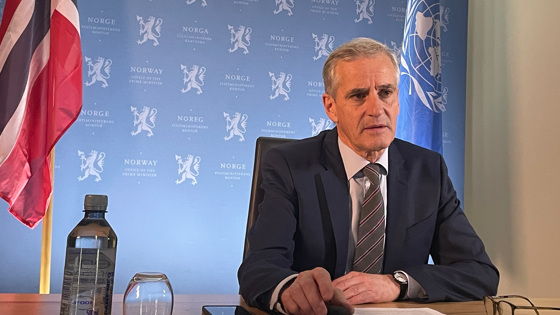High-level meeting on cooperation between the UN and the African Union
Tale/innlegg | Dato: 28.10.2021 | Statsministerens kontor
President, let me start by thanking you and Kenya for convening this timely debate, and the distinguished briefers for their insightful briefings.
Check against delivery

Through its peace operations and efforts to prevent, mitigate and resolve conflicts, the AU is an important partner to this Council.
During the past year, the AU and this Council have been faced with several complex and difficult situations. Tigray is one of them.
We welcome the AU’s leadership in addressing African conflicts. This was demonstrated by the AU Peace and Security Council’s firm actions in response to the ongoing military coup in Sudan. We must continue to work together to support the people of Sudan.
President,
The global challenges we face are disproportionately affecting Africa.
The pandemic continues to batter the continent with unrelenting force. There is a glaring inequity in vaccine distribution. We must work to ensure equitable access to vaccines, tests, and treatment – out of solidarity and recognition of our mutual interdependence.
We applaud Africa CDC’s role in mobilising Member States and leading the response to the pandemic. WHO has been a key partner in this work. A reminder of the importance of the partnership between the UN and the AU.
Norway will continue to work with partners on global health issues, as we have done with South Africa in the ACT-A Facilitation Council.
In two days’ time, world leaders will meet in Glasgow to discuss climate change, the defining issue of our time.
The links to security are clear: Over half of the 20 countries considered most vulnerable to climate change are also affected by armed conflict.
I thank Kenya, Niger, Tunisia and St Vincent and the Grenadines for their prominent role in placing the impacts of climate change higher on the Security Council’s agenda.
President,
Strategic partnerships can help Africa to achieve its ambitions and find solutions to pressing challenges.
We are encouraged by the AU’s Agenda 2063 and the ‘Silencing the Guns’ initiative.
The guns will not be silenced without women’s full, equal and meaningful participation and leadership. This is key to ensuring lasting peace.
We commend the 30 AU Member States that have developed Women, Peace and Security National Action Plans, based on resolutions adopted by this Council.
The Panel of the Wise and FemWise Africa, the network of African women mediators, play an important role in conflict prevention and mediation.
President,
Our shared goal is to prevent or contain conflict. Effective partnerships have been developed between UN envoys, AU representatives and sub-regional organisations in pursuit of this goal.
Protection of civilians must be at the core of all our efforts.
African countries play a vital role in peace operations. A strong partnership with the AU is one of the keys to success. For its part, Norway intends to continue to contribute to UN peace operations.
The UN and the AU Commission have made great strides in promoting more structured and strategic cooperation.
Norway is pleased to support these efforts. We now need greater political support from Member States.
It is our shared responsibility to strengthen cooperation between the UN Security Council and the AU Peace and Security Council.
Therefore, Norway recommends that:
- these councils meet on a more regular basis,
- that they carry out more joint visits,
- and that the UN Security Council should invite representatives from the AU and the Regional Economic Communities to provide more frequent briefings.
President,
Africa is home to a young and growing population. The people of Africa yearn for their continent to achieve stability, economic and social progress and fulfil its true promise. Peace and stability are the most important building blocks in enabling them to realise this ambition.
African countries provide critical insights, and cooperation with them is paramount in order to deal with security issues on the continent. That is why Norway supports efforts to expand the Council and increase the number of permanent and non-permanent seats for Africa.
Thank you.